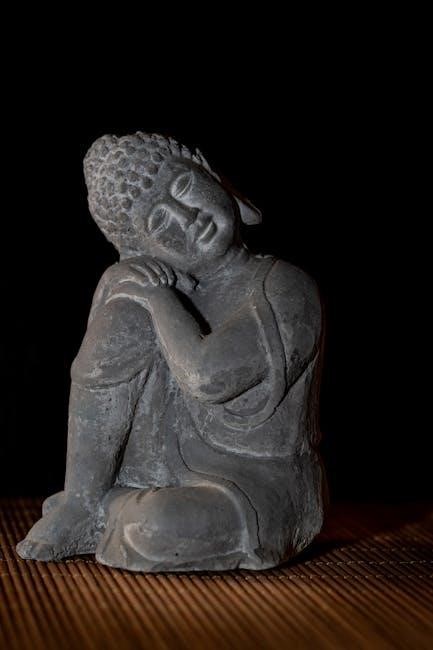1.1 Overview of the Book
The Wisdom of Solomon, a Deuterocanonical book, offers timeless teachings on divine wisdom, justice, and the immortal soul, addressing rulers and seekers of truth.
1.2 Historical Context and Significance
Written in Greek, it reflects Hellenistic influences, blending Jewish tradition with universal wisdom, emphasizing Solomon’s legendary wisdom as a gift from God.
The Wisdom of Solomon, a Deuterocanonical book, is recognized by the Roman Catholic, Greek Orthodox, and Russian Orthodox Churches. It explores themes of wisdom, immortality, and divine justice, addressing rulers and seekers of truth. The book is divided into three main sections, blending Jewish tradition with Hellenistic influences. Its authorship is traditionally attributed to King Solomon, though modern scholarship suggests a later composition. The text emphasizes the pursuit of righteousness and the rewards of virtuous living, offering practical wisdom for governance and personal spirituality. Available in PDF formats, the book remains a vital resource for theological study and reflection, bridging ancient and contemporary contexts.
The Wisdom of Solomon, likely written in the Hellenistic period, reflects a blend of Jewish theology and Greek philosophical thought. It is traditionally attributed to King Solomon but was probably composed later, around 100 BCE. The book emphasizes Solomon’s divine wisdom, granted by God, and explores themes of justice, immortality, and the nature of evil. Its historical significance lies in its influence on early Christian and Jewish thought, particularly in its portrayal of wisdom as a divine gift. Recognized as Scripture by Catholic and Orthodox traditions, it remains a vital text for understanding the evolution of religious ideas in the Second Temple period, offering insights into the intersection of faith and philosophy.

The Historical Background of King Solomon
King Solomon, the third ruler of Israel, succeeded his father David, leading a prosperous kingdom. God granted him wisdom, which became legendary.
2;1 King Solomon’s Reign and Achievements
King Solomon’s reign marked Israel’s golden age, characterized by peace and prosperity. He expanded Israel’s borders, established trade networks, and built monumental structures, including the Temple in Jerusalem. His wisdom, granted by God, became renowned, and people from distant lands sought his counsel. Solomon’s achievements were not only political and economic but also cultural, as he promoted learning and literature. His reign laid a strong foundation for Israel’s future, solidifying its position as a regional power. However, later in his life, Solomon faced challenges, including internal conflicts and external pressures, which tested his leadership and wisdom.
2.2 The Biblical Account of Solomon’s Wisdom
The Bible portrays King Solomon as a paragon of wisdom, granted by God in response to his humble request for understanding to lead Israel justly. In 1 Kings 4:29, it is written that God gave Solomon “wisdom and very great insight, and a breadth of understanding as measureless as the sand on the seashore.” His wisdom was demonstrated in his ability to govern effectively, resolve complex disputes, and compose profound proverbs and songs. A famous example is his judgment in the case of two women claiming the same child, showcasing his discernment and fairness. Solomon’s wisdom extended beyond governance, as he was also credited with composing 3,000 proverbs and 1,005 songs, highlighting his intellectual and creative genius. His reign became synonymous with divine wisdom and prosperity.

The Structure and Content of the Book
3.1 The Three Main Sections of the Book
The book is divided into three main sections: addressing rulers, exploring wisdom’s nature, and recounting its role in history, emphasizing righteousness and immortality.
The Wisdom of Solomon is structured into three distinct sections. The first part (Chapters 1–6) addresses rulers, urging them to embrace justice and righteousness. It emphasizes the importance of seeking wisdom and warns against the consequences of wickedness. The second section (Chapters 7–9) focuses on Solomon’s personal quest for wisdom, describing it as a divine gift and the source of all virtue. The third part (Chapters 10–19) recounts wisdom’s role in history, highlighting its guidance of biblical figures and its presence in Israel’s salvation history. Together, these sections weave a cohesive narrative, blending philosophical reflections with theological insights, ultimately presenting wisdom as the path to immortality and divine favor.
3.2 Key Themes and Teachings
The Wisdom of Solomon explores profound themes, including the nature of wisdom as a divine gift and its role in guiding humanity. It emphasizes the immortality of the soul, divine justice, and the ultimate triumph of righteousness over wickedness; The book contrasts the virtuous life with the futile pursuits of the ungodly, highlighting wisdom’s transformative power. It also personifies wisdom as a guiding force in history, active in the lives of biblical figures. Central teachings include the importance of fearing God, the fleeting nature of earthly life, and the eternal rewards of living justly. These themes provide moral and spiritual guidance, encouraging readers to seek wisdom, embrace virtue, and trust in God’s providence. The book’s teachings remain relevant, offering timeless insights into human existence and the path to a meaningful life.

The Theological Significance of the Wisdom of Solomon
The Wisdom of Solomon holds profound theological importance, emphasizing divine justice, the immortality of the soul, and wisdom as God’s gift, influencing Catholic and Orthodox traditions deeply.
4.1 Wisdom as a Divine Gift
The Wisdom of Solomon portrays wisdom as a divine gift from God, bestowed upon the righteous and those who seek it with a humble heart. It is described as a personification of God’s power, present at creation and guiding humanity. The book emphasizes that wisdom is not merely human knowledge but a supernatural endowment that brings eternal life and virtue. Solomon’s own wisdom, granted by God, is highlighted as a model of divine favor. The text underscores that wisdom is accessible to all who reverence God and live justly, serving as a source of strength and moral guidance. This theme aligns with the broader biblical concept of wisdom as a gift that transcends human understanding and fosters a deep connection with the divine.
4.2 The Book’s Influence on Religious Thought
The Wisdom of Solomon has profoundly influenced religious thought, particularly within Catholic, Greek Orthodox, and Russian Orthodox traditions, where it is recognized as Deuterocanonical Scripture. Its teachings on the immortality of the soul and divine retribution shaped early Christian doctrines. The book’s portrayal of Wisdom as a personified divine attribute inspired theological reflections on the nature of God and humanity. It also influenced the development of concepts like the Messiah and the afterlife. By bridging Jewish tradition with Hellenistic philosophy, the Wisdom of Solomon enriched religious discourse, offering universal truths that resonate across cultures. Its themes continue to inspire spiritual reflection and inform liturgical practices, solidifying its enduring impact on religious thought and practice.

The Wisdom of Solomon in Modern Context
The Wisdom of Solomon remains a timeless source of inspiration, offering guidance on justice, morality, and divine wisdom, resonating deeply in contemporary spirituality and personal growth.
5.1 Relevance in Contemporary Spirituality
The Wisdom of Solomon remains a profound guide in modern spirituality, offering timeless insights into justice, morality, and divine wisdom. Its teachings on the pursuit of righteousness and the fleeting nature of earthly desires resonate with contemporary seekers of truth. The book’s emphasis on wisdom as a divine gift continues to inspire personal growth and ethical decision-making. Its universal themes, such as the importance of living virtuously and understanding life’s purpose, transcend cultural and temporal boundaries. In a world grappling with complexity, the Wisdom of Solomon provides a steadfast foundation for nurturing the soul and fostering a deeper connection with the divine. Its accessibility in PDF formats has further amplified its reach, making it a valuable resource for spiritual reflection and guidance in the modern era.
5.2 How to Apply Solomon’s Wisdom Today
Applying Solomon’s wisdom today involves embracing virtues like justice, moderation, and courage, as outlined in the Wisdom of Solomon. Individuals can cultivate these traits by reflecting on the book’s teachings, such as the importance of seeking divine guidance and living a virtuous life. The Wisdom of Solomon encourages readers to balance material pursuits with spiritual growth, a message highly relevant in today’s fast-paced world. By studying the book, available in PDF formats, one can gain practical insights for ethical decision-making and personal development. Its lessons on resolving conflicts and fostering harmony also offer solutions for modern societal challenges. Ultimately, Solomon’s wisdom inspires individuals to align their actions with timeless moral principles, promoting a life of purpose and integrity. This ancient wisdom remains a powerful tool for navigating contemporary complexities.




